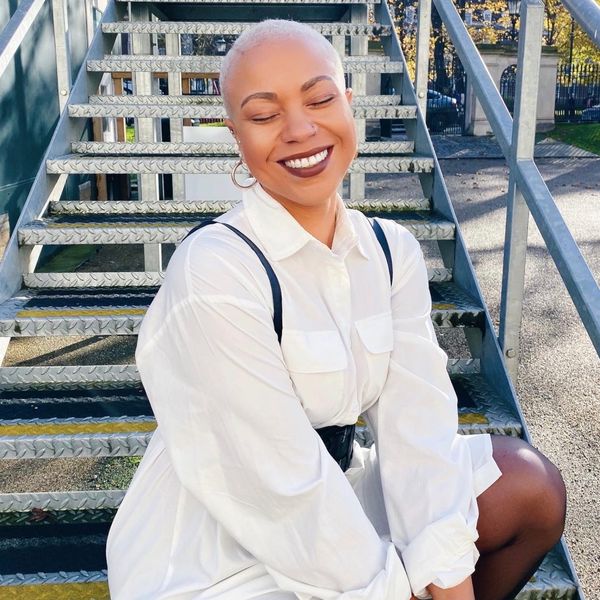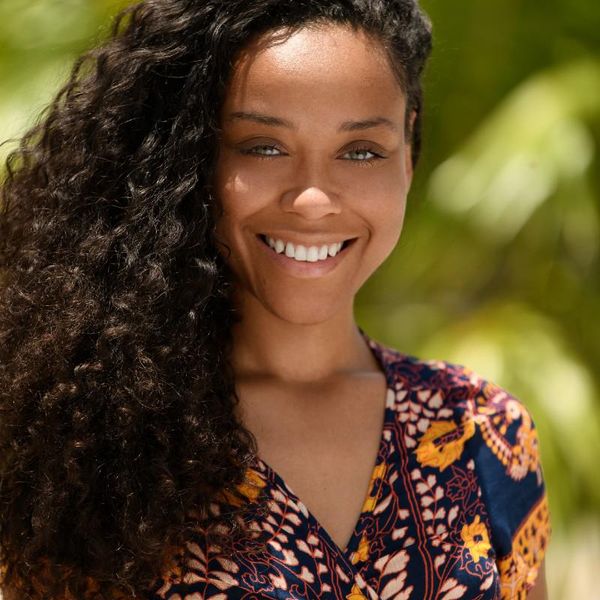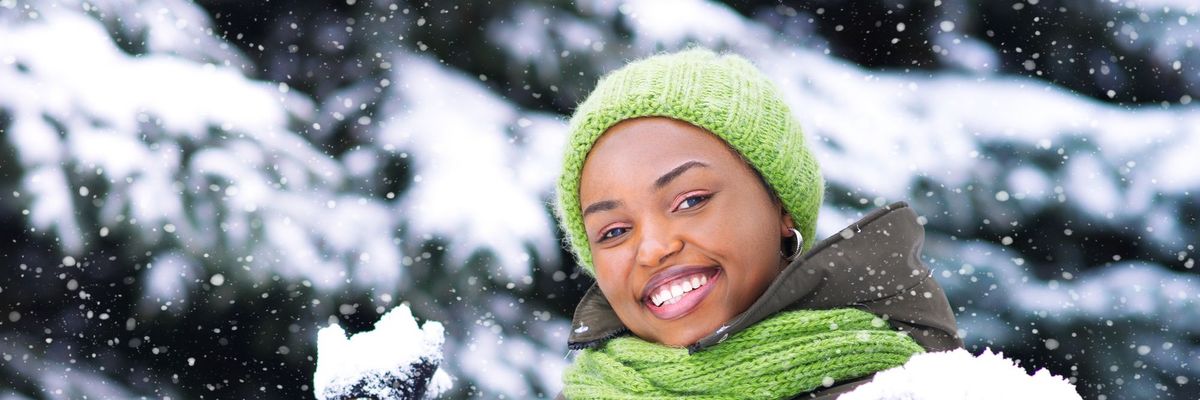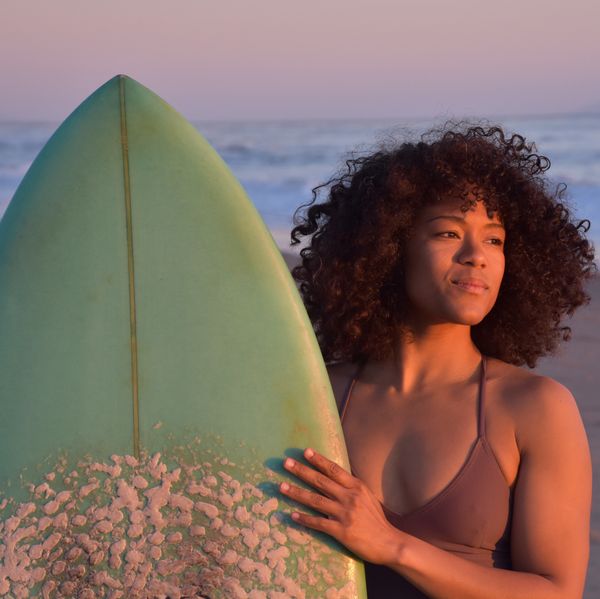
As Told To is a recurring segment on xoNecole where real women are given a platform to tell their stories in first-person narrative as told to a writer. If you have a story you'd like to share but aren't sure about how to put it into words, contact us at submissions@xonecole.com with the subject "As Told To" for your story to be featured.
This is Chelsea Woody's story, as told to Charmin Michelle.
I'm a Black woman with a full afro, and I surf.
I wanted to learn to surf since I was a teenager after seeing Kate Bosworth in the movie Blue Crush. I was enamored with everything about the movie: the surfer lifestyle, living in beach environments, how freeing the act of surfing made her feel.
As a teen, we're more enamored by the idea of just becoming a surfer or spending carefree summers along the beach. In reality, the lack of representation takes its toll, and you realize how differences can sometimes make it difficult to relate to anyone on the journey or break into surfing.
The more I reflect, the more I realized that Kate inspired me because she was the only example that I had of female surfers—despite looking nothing like me.
I didn't grow up in a coastal town, so I wasn't raised around surfing. I didn't actually learn to surf until much later in my life. It was always in the back of my mind, but whenever I found myself on vacation in places such as Hawaii, I could never convince myself to try out of fear of what those consequences might mean for my melanated features and my hair.
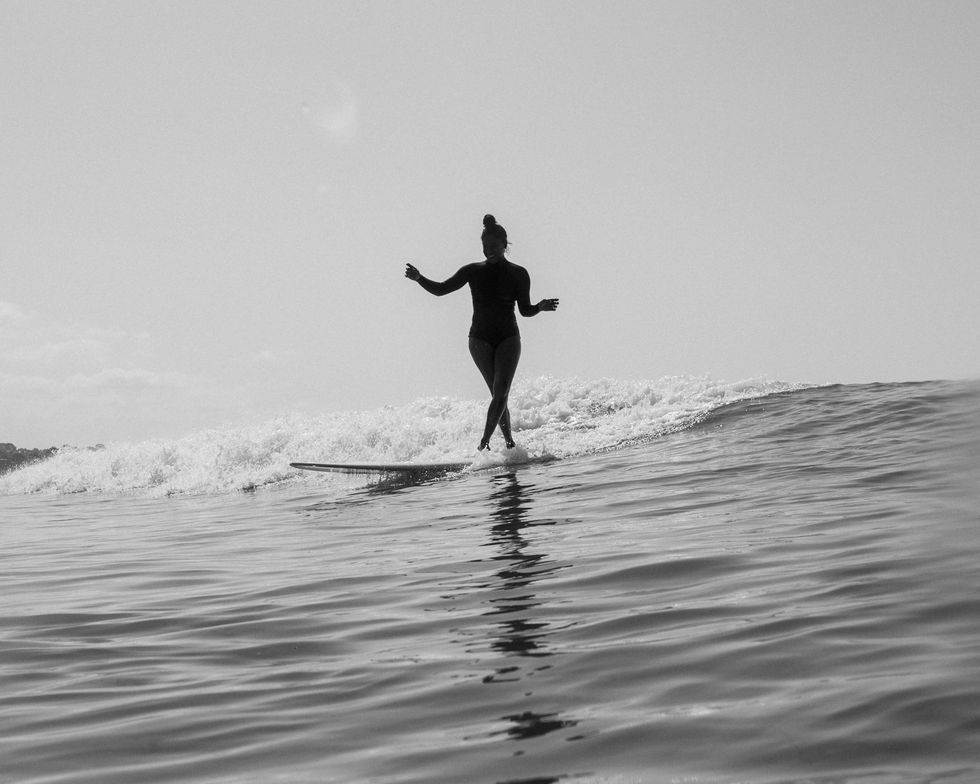
As crazy as it may sound (to others), we know that hair is a major excuse as to why many Black women choose not to participate in any water sport. The need to maintain unrealistic hairstyle upkeep, combined with the fear of the open ocean, and a necessary strength in swimming, means when I look around, I don't see many people—male or female—that look like me. These are also major reasons as to why we represent less than 1% of any water sport.
And unfortunately, for many Black and brown women, there is still a major antiquated view of skin tone and colorism that can keep us from spending time in the outdoors and sun.
Access to outdoor spaces and having family members or friends to pass down traditions also contribute to the lack of diversity.
It's unfortunate, but the facts. So, how do we weaken the stigma? How can we spark the interest in Black families to encourage them to add surfing to the list of what we can do?
We can give our community positive examples and resources to help them feel more comfortable in the ocean. Through representation, hopefully, we can encourage more Black families to get out in the surf lineup and know that we belong in these spaces. Then we can see the generational growth in outdoor spaces. When we see more folks that look like us, it begins to normalize what should already be normal.
A few years into my marriage, my husband and I decided to take a break from corporate life, quit our jobs, and travel abroad for a year and a half. I figured this was as good as time as any to finally learn to surf. We posted up in Indonesia for a few months and both committed ourselves to learning. We would hit the water every day for a month; it became a part of our daily routine.
Initially, when I first started surfing, I was a bit insecure about not fitting the typical surfer stereotype. In Indonesia, although the majority of the population shared my skin tone, there weren't many Indonesian women who surfed, and there certainly weren't any Black women. Additionally, swimsuit options didn't fit my athletic body type the same, and my protective braided hairstyles made me stand out.
Refusing to be discouraged, I didn't allow my outward appearance to be indicative of my interests. But oftentimes, when people have the similar interests, there's a tendency to want to fit a certain mold to make sure people know that you belong to that group. I quickly realized that my surf style wasn't at risk of emulating anyone, my flavor was a little different. And I really learned to embrace that.
I didn't need to try to fit into a space that didn't have people like me in mind at all, allowing me to be unapologetically myself. That was one of my most liberating realizations in my surfing. But I still had more work to do.
You know how, as a Black or brown person in a "particular" room, you see another sister or brother, and suddenly you're immediately connected? That's similar to how my surf sisters bonded over our relationship with the ocean. Certain experiences we have surfing just don't need explanation, they understand and can relate. It has been such a blessing finding these women. The ladies and I would regularly discuss the lack of diversity, what the sport considers marketable, and how that impacts surfing for future generations who are both free surfers and competitive.
We collectively knew there had to be more Black and brown girls who are interested in surfing; those who surf and are unapologetically who they are. And in the slight chance that there weren't any, we knew the importance of showing examples of what we didn't have when we got started
Soon, our community, Textured Waves, was born. We're just four African-American female surfers who wanted to create a space for women of all shades who surf. We support each other through sisterly camaraderie and creative outlets related to surfing, and we aim to change the narrative of who is a surfer through imagery and representation. We're even working on a few short film projects that showcase the beauty of African-American female surfers. If you can believe it, nothing like this exists.
It's all a full circle moment, and why I fight so hard to promote diversity in the sport.
Here in the States, we are a lot further behind other countries in terms of representation in the surf world. That has a lot to do with the history of this country: slavery, Jim Crow, segregation at beaches and in swimming pools, I could go on and on. But I hope Black women reclaim their place in the sea, and, eventually, we get to see a 'Serena Williams' of surfing, representing us on a competitive world stage. I hope that in the future we begin to see more diversity in aquatics and beach life as a whole.
As often as I can, I try to surf. I am happiest and feel most beautiful when I'm gliding up and down on a wave in my flow. Carving my own lines on the wave feels like dancing on water to me. No matter what it looks like to anyone else, I know what it feels like to me, and that is the most beautiful feeling.
That feeling will forever be unexplainable.
This year, we are no longer accepting representation that is limited to what we're shown. We have to expound our interests to go beyond and visualize our wildest dreams. Women who go against the grain inspire me.
So in essence, I'm inspired by my sea sisters who work to challenge the visuals we see on the daily.
To keep up with Chelsea's journey, you may follow her on Instagram @chel.bythe.sea. Also, to learn how you can join the movement, you can visit Textured Waves' website for more information.
Featured image courtesy of Chelsea Woody
Originally published February 4, 2020
This Is How To Keep 'Holiday Season Stress' From Infecting Your Relationship
Hmph. Maybe it’s just me, but it seems like there is something really weird happening in the fall season air (because winter doesn’t officially begin until December 21) that cuddle season is in full swing while break-up season is as well. In fact, did you know that break-ups are so popular during the holiday season that December 11 is deemed Break-Up Day?
The reasons why relationships shift around this time vary; however, I did both roll my eyes and chuckle when I read that a very popular one is because it’s an easy way to get out of getting one’s significant other a Christmas present. SMDH.
Anyway, I personally think that the less shallow folks out here may contemplate calling things “quits” or they at least distance themselves a bit from their partner (and what I’m referring to is serious relationships) due to all of the stress and strain that oftentimes comes with the holidays whether it be financial, familial, due to their tight schedules or something else.
Listen, I would hate for you and your man to miss the fun and happiness of experiencing this time of year, all because you are so overwhelmed or irritated that you can’t really enjoy it. That’s why I have a few practical tips for how to avoid allowing the typical holiday season stress from INFECTING your relationship.
Manage Your Expectations
 Giphy
GiphyUnmanaged expectations. If there is a main reason why the holiday season tends to be so stress-filled for so many people, I’d bet good money that this is the cause. And when you’re in a long-term relationship, expectations can manifest themselves in all sorts of cryptic and/or unexpected ways. You might have relatives who assume that you are going to be with them for Thanksgiving or Christmas when you have other plans in mind. You might be thinking that you are going to spend one amount for presents while your man is thinking something totally different. When it comes to scheduling, your signals may be crossed.
And you know what? To all of these scenarios, this is where clear and consistent communication come in. Don’t assume anything. Don’t dictate anything either. From now until New Year’s, mutually decide to check in once a week, just to make sure that you are both on the same page as it relates to the holidays and what you both are thinking will come along with it. The less blindsided you both feel, the less stressed out you will be. Trust me on this.
Set (and Keep) a Budget
 Giphy
GiphyOkay, so I read that last year, 36 percent of Americans incurred some type of holiday-related debt. Hmph. Last year, there was still some sense of normalcy in this country, chile, so I can only imagine what finances are gonna look like over the next several weeks. That said, since I don’t know a lot of people who don’t find being broke stressful, make sure that you and your bae set a budget and then stick to it this year — no ifs, ands or buts.
Because really, y’all — it doesn’t make sense to deplete savings and/or max out credit cards for a few days of giggles only to be damn near losing your mind because you don’t know how to make ends meet come Dr. Martin Luther King, Jr. Day.
And by the way, this tip doesn’t just speak to things like food and gifts; I also mean travel. If it doesn’t make a ton of sense (or cents) to be all over the place this year — DON’T BE.
Keep Matthew 5:37 at the Forefront
 Giphy
GiphyIf off the top of your head, you don’t know what Matthew 5:37 says, no worries, here ya go: “But let your ‘Yes’ be ‘Yes,’ and your ‘No,’ ‘No.’ For whatever is more than these is from the evil one.” That verse right there? Oh, it’s a boundaries lifesaver! I say that because do you see “maybe” or “I’ll think about it” in there? Nope. LOL. It says that you should tell people “yes” or “no” and leave it at that — and that complements Anne Lamott’s quote, “’No’ is a complete sentence” impeccably well. Yeah, you’ve got to remember that anything beyond a yes or no to a request is privileged information; you don’t owe anyone details or an explanation.
Besides, if you are really honest with yourself, when someone asks you something and you give a “Umm, let me think about it” kind of reply, more times than not, you already know what your answer is going to be — so why not let you both off of the hook? Give your response. Commit to that. And let everyone (including yourself) get on with their lives and schedules.
I promise you that when it comes to those holiday parties, you are pissing more folks off by not RSVP’ing or doing so and not showing up than just saying, “Thank you but not this year” off the rip.
Remember That Your Personal Space Is Privilege Not a Right
 Giphy
GiphyA friend of mine recently bought a new house and invited me over to come see it. He’s a single man with no children, so as I was taking in all of the space that he had, especially as I walked through his finished basement, I joked about relatives coming to live with him. “Hell no” and “absolutely not” were pretty much his immediate responses as he went on to say that some folks even had the nerve to be offended when he told them that he had no intentions on taking DNA in.
Ain’t it wild how people think that your stuff is their right? And yes, that brings me to my next point. Your home is your sanctuary space. If you want to host folks this year — cool. If not, ALSO COOL. Please don’t let folks (family included) guilt you into how they want you to act or even into what they would do if the shoe was on the other foot. You are not them — and as one of my favorite quotes states, “If two people were exactly alike, one of them would be unnecessary.” (A man by the name Larry Dixon said that.)
Hell, my friends? They know that I am good for sending them random things that they need or even want all throughout the year. Coming over to hang out at my pace, though. Uh-uh. Chalk it up to being a card-carrying member of the ambivert club yet I like keeping my living space personal — and I sleep like a baby, each and every night, for feeling that way.
Always remember that your space, your time, your resources, your energy and shoot, yourself period (including your relationship), are all things that are your own. You get to choose how, when and why you want to share them. The holiday season is certainly no exception.
Cultivate Some “You Two Only” Traditions
 Giphy
GiphyIt’s not uncommon for some couples to hit me up after the holiday season to “detox.” Sometimes it’s due to the financial drama (and sometimes trauma) that they experienced. Sometimes it’s because they allowed their relatives (especially in-laws) to get more into their personal business than they should’ve. More than anything, though, it tends to be because they didn’t get enough quality time together and so ended up feeling “disconnected.”
Please don’t let that happen. Listen, I’m not even a holidays kind of woman and yet, I will absolutely sit myself down with some hot chocolate and chocolate chip cookies to enjoy a Hallmark holiday film or two. Aside from the fact that most of them are lighthearted and sweet, I also like that they usually focus on couples loving on each other amidst all of the holiday beauty and ambiance — which is something that all couples should set aside some time to do.
Maybe it’s a vacation. Maybe it’s a staycation. Or maybe it’s my personal favorite, A SEXCATION. Whether it’s for a few days, the weekend or even overnight — don’t you let the holidays go by without setting aside time for you and your man to celebrate one another. Don’t you dare (check out “Are You Ready To Have Some Very Merry 'Christmas Sex'?”).
GET. SOME. REST.
 Giphy
GiphyI once read that 8 out of 10 people get stressed out over the holidays and 3 out of 10 lose sleep during to it — and when you’re stress-filled and sleep-deprived, that can absolutely lead to hypersensitivity, making mountains out of molehills and even not being in the mood for sex.
Your relationship can’t afford to go through any of this, so definitely make sure to prioritize rest. I don’t care how unrealistic it might seem during this time, sleep should never be seen as a luxury; it will always and forever be a great necessity.
That said, try to get no less than six hours of shut-eye in (check out “6 Fascinating Ways Sex And Sleep Definitely Go Hand In Hand”) and even ask your bae to take a nap with you sometimes (check out “Wanna Have Some Next-Level Sex? Take A Nap, Sis.”). Not only will sleep help to restore your mind, body and spirit but, when it’s with your partner, it’s an act of intimacy that can make you both feel super connected, even in the midst of what might feel like chaos.
___
Holiday season stress is real. Still, never give it the permission or power to throw your relationship off. Put you and your man first and let the holidays be what they are gonna be, chile.
Let’s make things inbox official! Sign up for the xoNecole newsletter for love, wellness, career, and exclusive content delivered straight to your inbox.
Featured image by Shutterstock
Dreaming Of A White Christmas? These 7 Winter Wonderland Destinations Are Perfect For The Holidays
While most people opt for a tropical vacation during the winter months, there are still many people who want to fulfill their winter wonderland fantasies, which are more than likely centered on watching snow by the fireplace while sipping some hot cocoa.
With Thanksgiving vastly approaching and Christmas a little under a month away, there is still time to ditch the traditional Christmas home to visit family or friends.
Whether you’re looking to put a new stamp on your passport and keep things domestic with a destination in the States, xoNecole has you covered with a few hotspots for those itching to go somewhere cold (but with cozy vibes) this holiday season.
Aspen, Colorado
Our Christmas queen, Mariah Carey, has been taking an annual trip to this snowy destination since 1997, just three years after dropping the track that would make her the unofficial (but official to us) ambassador of the winter holiday.
Aside from being a key vacation spot for one of the culture’s greatest musicians, Aspen also offers travelers access to world-class skiing and snowboarding and four distinct mountains that provide the perfect backdrop for a winter vacation.
Whistler, British Columbia, Canada
Home to the largest ski resort in North America, Whistler Blackcomb, this destination is located in the Coast Mountain Range and is about 75 miles north of Vancouver.
From luxury spas like Scandinave Spa Whistler to Olympic Park, this is another top winter vacation spot that offers a unique experience for people who love snow and the thrill of a good adventure.
Western Massachusetts
Dubbed the place for a magical holiday escape, Springfield, Massachusetts, blends the warmth of small-town charm with unforgettable experiences like Grinchmas at Springfield Museums, Winterlights at Naumkeag in Stockbridge, Historic Deerfield’s Winter Frolic, and many others.
This destination offers something for all ages, and it’s close to home, making it all the more reason to place on your radar for a winter getaway.
Rovaniemi, Finland
If you want to really get into the Christmas spirit, this just may be the place for you. As the official home to Saint Nick himself, Rovaniemi, Finland offers reindeer sleigh rides, the opportunity to stay in a glass igloo, as well as an opportunity to experience the Santa Claus Village.
Lake Tahoe, California/Nevada
Who says that visits to the lake house are only reserved for summer vacation? A winter trip to Lake Tahoe is equipped with stunning lake views and top-notch ski resorts, including Heavenly and Northstar.
Chamonix, France
Sitting at the base of Mont Blanc, Chamonix, France, is known for its skiing and mountaineering. This destination is home to the Aiguille du Midi cable car, the charming Alpine village, and is also close to various other European ski destinations.
Northeastern Pennsylvania
This area of the U.S. state is home to the Poconos Mountains, whose renowned ski resorts include Camelback Mountain, Blue Mountain, and Jack Frost Big Boulder. Whether you’re a ski expert, a beginner, or just there for the vibes, this destination makes for a winter vacation that balances fun adventures and cozy getaways. Additionally, Pennsylvania is home to the Christmas Tree Capital of the world.
Feature image by Shutterstock
Originally published on November 23, 2024






